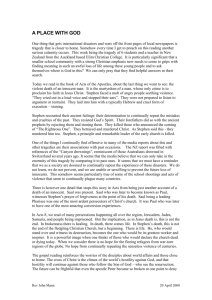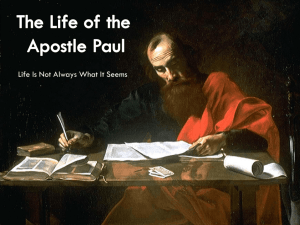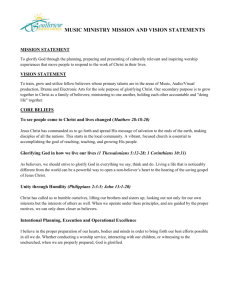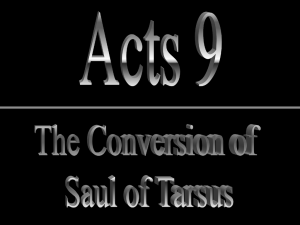Week 22 Jesus and His Kingdom
advertisement
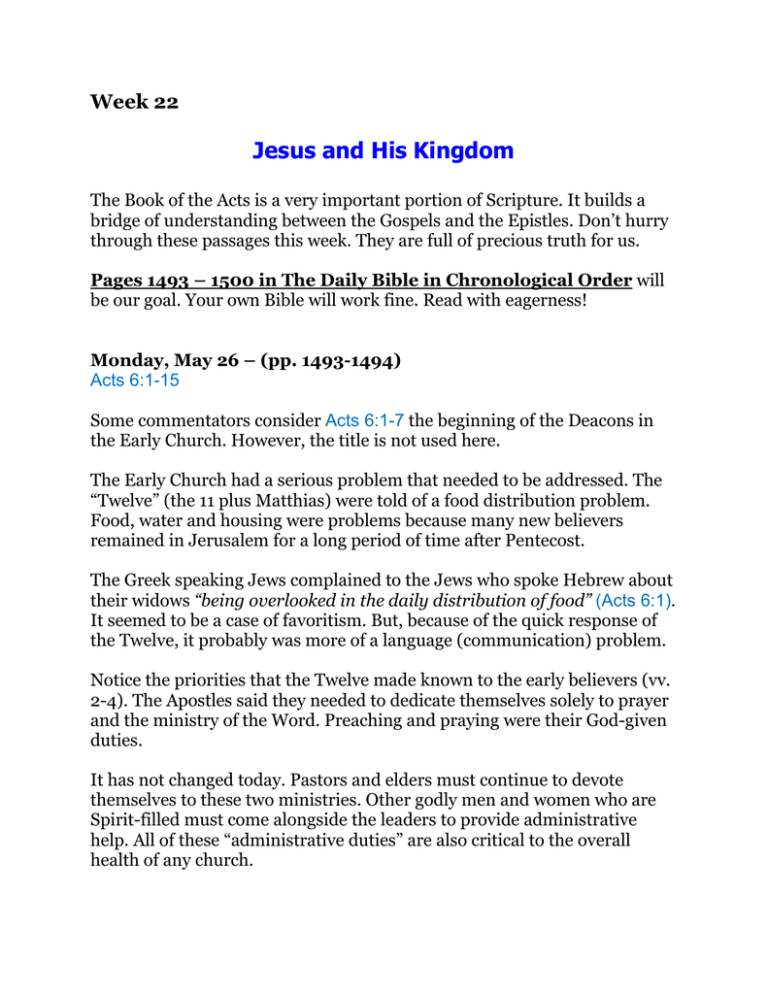
Week 22 Jesus and His Kingdom The Book of the Acts is a very important portion of Scripture. It builds a bridge of understanding between the Gospels and the Epistles. Don’t hurry through these passages this week. They are full of precious truth for us. Pages 1493 – 1500 in The Daily Bible in Chronological Order will be our goal. Your own Bible will work fine. Read with eagerness! Monday, May 26 – (pp. 1493-1494) Acts 6:1-15 Some commentators consider Acts 6:1-7 the beginning of the Deacons in the Early Church. However, the title is not used here. The Early Church had a serious problem that needed to be addressed. The “Twelve” (the 11 plus Matthias) were told of a food distribution problem. Food, water and housing were problems because many new believers remained in Jerusalem for a long period of time after Pentecost. The Greek speaking Jews complained to the Jews who spoke Hebrew about their widows “being overlooked in the daily distribution of food” (Acts 6:1). It seemed to be a case of favoritism. But, because of the quick response of the Twelve, it probably was more of a language (communication) problem. Notice the priorities that the Twelve made known to the early believers (vv. 2-4). The Apostles said they needed to dedicate themselves solely to prayer and the ministry of the Word. Preaching and praying were their God-given duties. It has not changed today. Pastors and elders must continue to devote themselves to these two ministries. Other godly men and women who are Spirit-filled must come alongside the leaders to provide administrative help. All of these “administrative duties” are also critical to the overall health of any church. Because God has gifted each of us who knows Christ with at least one spiritual gift, we are to offer our gift(s) in service to Him. If we are a leader, then we must stay focused on prayer and the Word. If we are not in leadership, then our administrative skills are essential in the work of the Church. Notice how the seven men chosen to serve were well-respected and Spiritfilled people. The administrative duties were so important that a spiritfilled, godly character was required, as well. It’s still the same today. The duty of “waiting on tables” (Acts 6:2) demonstrated Christ’s compassion to those who could not provide for themselves. It’s still the same today. Serving others needs to be done by godly, Spirit-filled people. Has God gifted you to “wait on tables”? “Deacon” Stephen’s Arrest (vv. 8-15) To read of Stephen (one of the first “deacons”) being full of grace and power, doing great wonders and miracles, having wisdom beyond others … makes a strong statement about how one must serve in the body of Christ. No room for “half-baked” Christians. “Go the whole way with your faith!” No half-committed faith will ever do. They won’t be able to stand up under the strain, the struggle, and the persecution that will inevitably come. Just follow what happened to Stephen. He became the Church’s first martyr. But he faced it fearlessly by challenging the religious and political power brokers of his day with grace and strength. Dr. Luke said this about Stephen: “All who were sitting in the Sanhedrin looked intently at Stephen, and they saw that his face was like the face of an angel.” Being a moderate Christian isn’t enough! Having a lukewarm, temperate faith just will not get us through a battle like Stephen had to face (Acts 6:9-14). Surely, we will face battles, right? Stephen was obviously ready to face the “heat.” Am I? Maybe I should review whether I have a moderate or a “deep” faith today. In reviewing my faith, I found James 1:2-3 and 1 Peter 1:6-7 very helpful. Tuesday, May 27 – (p. 1494) Acts 7:1-19 Stephen began a “defense” of the accusations (Acts 6:13-14) that had been brought against him in front of the High Priest. But he, instead, went on the “offensive” arguing forcefully that Israel had consistently experienced the grace of God but had rejected it each time. Stephen’s message is one of the longest in the New Testament. He reviewed the history of Israel superbly and made it clear that Israel had always rejected God’s chosen leaders. That was not a message the members of the Sanhedrin wanted to hear (Acts 7:54). Stephen’s summary of God’s covenant to Abraham (Acts 7:2-8) reminded the Sanhedrin that Israel did not have possession of the Promised Land because of their disobedience. Hard to hear this, I’m sure. But it was true. Disobedience will always bring the judgment and discipline of God. The summary of Joseph’s leadership (Acts 7:9-16) pressed the point once more; that Israel had constantly rejected the Lord’s chosen leaders, even Joseph. No wonder they were “furious” (Acts 7:54). Acts 7:17-19 is a very important “bridge” that Stephen used to make clear to these religious leaders of Israel that God would still honor His covenant to Abraham. Through all the rebellion and judgment of the past, God would still be with His people. He would provide even another leader who would lead well. Obedience to God and submission to leadership is so important. How painful it was for Israel! How painful it could be for us if obedience and submission are not part of our daily life. Wednesday, May 28 – (pp. 1494-1496) Acts 7:20 – 8:1a Stephen’s message continues with the same intensity as we read yesterday. Moses was God’s chosen leader (Acts 7:17-41) and yet they still rebelled against God and rejected God’s will. A key verse says it all; “… in their hearts (they) turned back to Egypt” (vs. 39). Moses gave them the Word of God, performed miracles, met their needs in the wilderness and faithfully led them. Yet the Israelites turned away! Later, Stephen unabashedly told them that they had done the same thing to Jesus, God’s chosen leader (Acts 7:51-53). The fury is building! Stephen used two Prophets (Amos and Isaiah – Acts 7:42-50) to tell Israel that their religious faith was a formality. As the prophets said; they had an outward form of religion but no heart for the deep things of God. Their fathers even rejected and killed the prophets (Matthew 23:29-39). And when the Prophet (Christ) appeared (vv. 37 & 52), they rejected and killed him, as well. As Stephen faced death, he lifted his eyes to heaven seeing the glory of God and Jesus standing in the place of honor at God’s right hand (vv. 55-56). This was testimony that could not be tolerated by the Sanhedrin Counsel. But with the early believers, they were words that stirred deeper devotion to Jesus. Saul stood by and supported all of this terrible rebellion and the murder of an innocent person. However, there is a suspicion in my heart that Saul (later called Paul) was profoundly affected by this sad chapter in his life. Stephen’s prayer showed a deep love for those who hated him (Acts 7:5960). It reminded me of Jesus’ words in Luke 6:28. Look it up and use it in your prayer today for someone who’s mistreated you. Thursday, May 29 – (pp. 1496-1498) Acts 8:1b-25 Stephen’s martyrdom initiated severe persecution for the Early Church. Saul (later named Paul) participated in the persecution with great intensity. With this sad treatment many of these new believers left Jerusalem and pushed into Judea, Samaria and beyond (Acts 8:1-4). But remember, Jesus had commissioned them to go beyond Jerusalem to spread the Good News (Acts 1:8). God ultimately used this persecution to bring huge numbers to Christ and into His Church. This is just like the Lord; to bring great results through our suffering. But it is so uncomfortable to go through these painful times. We don’t want to experience such things, but discomfort may be the best thing for us when we have confidence that He will work through our hurts (1 Peter 4:13). As I was thinking about this short section (Acts 8:1-4), this thought surfaced for me: “When I am tempted to complain about the pain or suffering I’m facing, I need to stop and ask the Lord if He might be preparing me for a special task”. It could very well be that He is! As we read about Philip the evangelist (Acts 8:5-25), we get a clear example of how the Gospel was spreading so fast and so successfully. Philip was not one of the 12 Apostles. This Philip was Greek and was one of the seven men chosen to wait on tables in Acts 6:1-7. Philip, being a Greek Christian, could probably “relate” better to the Samaritans than any of the Jewish Christian believers. The Jews thought of Samaritans as second class people. So, it’s not hard to picture God’s plan to send someone to the Samaritans who might better identify with them. In preaching Jesus to the Samaritans there was a tremendous response. This was a crucial moment for the spread of the Gospel and for the growth of the Early Church. Many Jewish Christian believers did not understand fully that God would be including all Gentiles into the Kingdom. We really don’t even see the Apostles understanding this truth until Peter experienced his visions of the sheets coming down from heaven (Acts 10) and his meeting of the Gentile Cornelius (Acts 11). With such a powerful response to the Gospel by the Gentiles it was natural for the Early Church to send Peter and John to investigate. They determined that these Samaritans were true believers and that the Holy Spirit worked in Jew and Gentile alike as they surrendered to Jesus, the Messiah. This was a special event. There was a distinct outpouring of the Holy Spirit on these new Gentile believers to demonstrate to Peter and John that God was calling all men to be part of His New Covenant family. Peter, John and the Early Church leaders needed this powerful confirmation. Later, there would be another special outpouring of the Holy Spirit with Cornelius and his family (Acts 10:44-47). This was a clear sign that the uncircumcised Gentiles could receive the Gospel and His Spirit. The episode of Simon the Sorcerer (Acts 8:9-24) accounts for a considerable part of our text today. I asked myself, “Why?” Let me offer these ideas: There will always be spiritual counterfeits. People who say they have received Jesus as Lord and Savior … who even submit to water baptism … but are in the “game” of Christianity for personal gain. Reading about Simon has stirred me to think about whether there are times in my own life where I’ve sought spiritual power for personal gain. My prayer today is that I don’t ever do such a thing. Friday, May 30 – (p. 1498) Acts 8:26-40 Philip the Evangelist’s encounter with the Ethiopian Eunuch reveals quite a powerful evangelistic plan that is very helpful. I believe we could use it as a model today. Here is what I’ve observed. First: Philip was very much in tune with the Spirit of God. Two times the Holy Spirit prompted him and Philip listened. The more we learn about how the Spirit prompts our hearts, the better at obedience we will be. Sometimes we also must take a risk in approaching a stranger if we hear an inner prompting to do so. This reminded me of Paul’s words in Romans 8:14. Second: Philip discovered that God had already prepared the heart of this Ethiopian before he spoke to him. There will be those who have “good soil” hearts (Luke 8:15). Our job is to be Spirit filled and Spirit led so that God directs us to the exact one. Third: Philip began with a question. Then he encouraged the Ethiopian to ask a question of his own. How important it is to let people know we care about their thoughts and ideas! Listening and discerning are foundational to good witnessing. Fourth: Philip based everything he said on the Scriptures and made Jesus the central point of his testimony. Why would we do anything else? Scripture and Jesus! That’s what it’s about! This is where a good witness stretches himself/herself! Learning the Scriptures and learning about Jesus is where we grow! Fifth: Philip didn’t allow cultural barriers or ethnic differences to get in the way as he invited the man to believe in Jesus. The Lord is saving people from all nations, ethnic groups, clans, tribes, languages, economic subcultures, social networks, the poor, the outcast and whatever group may be named! One day all of heaven will prove to us that “God so loved the world” (John 3:16; Revelation 15:4b). Sixth: Philip’s spiritual discernment helped the Eunuch respond to his desire to be baptized after he believed. Once a person has openly given himself/herself to Christ, baptism becomes the next step of obedience. Philip was right there for him. Helping someone else take steps to obey Christ is what discipleship is all about. Pondering this story produced this thought: When God prompts us to speak up, do it. He’ll give the courage, the words, the right person and the right response as we lean on Him in faith. Saturday, May 31 – (pp. 1499-1500) Acts 9:1-19a Saul’s conversion to Christ was dramatic. He did not see a vision; he saw the risen Christ Himself (Acts 9:17). Saul confessed his sin, acknowledged Jesus as Lord and resolved in his heart to obey Him. These are marks of a true conversion; a real transformation of character and a vibrant love relationship with the Savior! That was Saul. His whole life was changed! Eventually even his name had to change … to Paul the Apostle. I can’t imagine how hard it was for Ananias to step out, obey God and believe the story of this man named Saul. This “evil” man had done horrible things to those who followed Christ! But Ananias did step up to the plate. He went to Saul. Obedience is the key! There comes moments in each of our lives when we must not limit the power of God to change peoples’ lives … especially those who are very difficult or evil. We may face severe suffering or intense doubt in the process. But faithful obedience is the best. Ananias’ obedience ultimately led to Saul becoming a missionary to the Gentiles, a witness to kings, an instrument of God’s grace to Israel … and a testimony of how God uses suffering to glorify His Name (Acts 9:15-16). Who of us really knows what God might do through our lives if we would just step out in faith and obey Him. Saul’s conversion because of Ananias’ obedience should get us thinking about this today. My prayer is that we would risk being like Ananias. Sunday, June 1 – (p. 1500) Acts 9:19b-31 Immediately after Saul’s conversion he spent some time with the believers in Damascus. He needed to learn more about Jesus before witnessing. But very shortly (“at once” vs. 20) he set out to visit their synagogues and tell them that “Jesus is the Son of God.” We should never wait before telling another person what Jesus has done for us. We don’t want to be unprepared. But, neither do we want to miss the opportunity of sharing with another person the Good News of the Gospel of Christ. Learn enough about Jesus and go! What Saul taught in the synagogues of Damascus was so powerful, but baffling and astonishing at the same time. Those who heard him preach about Jesus saw a man who had also been dramatically changed. No one can really argue with a changed life. It is important to know what the Bible teaches and how you can defend its truth. But your/my life must back up the words we proclaim. Things got difficult for Saul in Damascus and his life was threatened (Acts 9:24). The brothers came together and helped him escape over the city wall. The risk of taking care of another needy brother in Christ is always costly. But it is the way of His people (John 13:34-35). The storyline suggests that Jerusalem was Saul’s next stop. However, Galatians 1:17-18 indicates that Saul left Damascus and traveled to Arabia where he lived for about three years. Having a three year period for his personal spiritual growth before his trip to Jerusalem would make good sense. For, in this visit to Jerusalem we see a man who has learned to boldly preach and debate in the name of the Lord (Acts 9:28). Committing ourselves to a plan of spiritual development is so important. What’s your plan? Don’t miss how Barnabas stood up for Saul (Acts 9:27). The risk Barnabas took was very significant. Saul still had a terrible reputation … and it takes a long time to change what has been damaged through disobedience and sin. But faithful old Barnabas became a bridge-builder between Saul and the early believers. Those who are new in the faith need people who will “sponsor” them, encourage them, teach them, admonish them, love them … and introduce them to the other members of the Body of Christ. I’m asking myself today if I am becoming a better “Barnabas” so that new believers in Christ can be welcomed into this amazing Family of God. “Thank You, Lord, for making Your Word so powerful! Amen.” Pastor Doug
